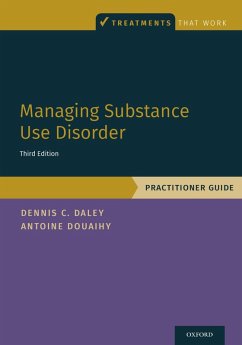Managing Substance Use Disorder: Your Substance Use Disorder: Client Workbook Practitioner Guide provides practical and empirically-based strategies for addressing and stopping substance use, and for changing daily lifestyle and behaviors that contribute to continued use. Healthcare practitioners in medical, psychiatric, addiction, and social services settings will find comprehensive information on substance use disorders, current trends, DSM-5 substance related disorders, and causes and effects of these disorders. Designed to accompany Managing Your Substance Use Disorder: Client Workbook, this manualized guide provides a detailed description of screening and assessment strategies and treatment approaches (medications and psychosocial), integrating evidenced-based interventions with the authors' extensive clinical experiences. Mutual support programs and the impact on the family and concerned significant others are also discussed, as are the most common challenges faced by individuals with a substance use disorder, such as managing cravings, resisting social pressures to use substances, coping with negative emotions and moods, building a social support network, involving family or concerned significant others, and reducing relapse risk. This expanded third edition also includes a new chapter on the management of co-occurring psychiatric disorders.
Dieser Download kann aus rechtlichen Gründen nur mit Rechnungsadresse in A, B, BG, CY, CZ, D, DK, EW, E, FIN, F, GR, HR, H, IRL, I, LT, L, LR, M, NL, PL, P, R, S, SLO, SK ausgeliefert werden.


